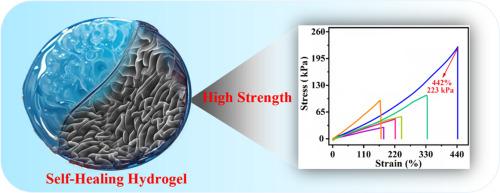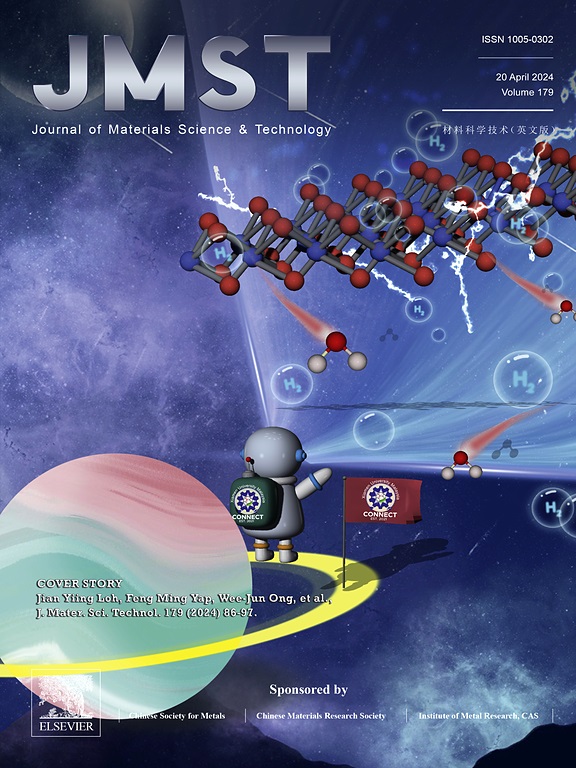High-strength self-healing multi-functional hydrogels with worm-like surface through hydrothermal-freeze-thaw method
IF 11.2
1区 材料科学
Q1 MATERIALS SCIENCE, MULTIDISCIPLINARY
引用次数: 0
Abstract
Soft self-healing materials are promising candidates for flexible electronic devices due to their exceptional compatibility, extensibility, and self-restorability. Generally, these materials suffer from low tensile strength and susceptibility to fracture because of the restricted microstructure design. Herein, we propose a hydrothermal-freeze-thaw method to construct high-strength self-healing hydrogels with even interconnected networks and distinctive wrinkled surfaces. The integration of the wrinkled outer surface with the three-dimensional internal network confers the self-healing hydrogel with enhanced mechanical strength. This hydrogel achieves a tensile strength of 223 kPa, a breaking elongation of 442%, an adhesion strength of 57.6 kPa, and an adhesion energy of 237.2 J m-2. Meanwhile, the hydrogel demonstrates impressive self-repair capability (repair efficiency: 93%). Moreover, the density functional theory (DFT) calculations are used to substantiate the stable existence of hydrogen bonding between the PPPBG hydrogel and water molecules which ensures the durability of the PPPBG hydrogel for long-term application. The measurements demonstrate that this multifunctional hydrogel possesses the requisite sensitivity and durability to serve as a strain sensor, which monitors a spectrum of motion signals including subtle vocalizations, pronounced facial expressions, and limb articulations. This work presents a viable strategy for healthcare monitoring, soft robotics, and interactive electronic skins.

通过水热冻融法获得具有蠕虫状表面的高强度自愈合多功能水凝胶
软性自愈合材料具有卓越的兼容性、延展性和自恢复性,是柔性电子设备的理想候选材料。一般来说,由于微观结构设计的限制,这些材料的拉伸强度较低,并且容易断裂。在此,我们提出了一种水热冻融法,用于构建具有均匀互连网络和独特褶皱表面的高强度自愈合水凝胶。皱纹外表面与三维内部网络的结合使自愈合水凝胶具有更高的机械强度。这种水凝胶的拉伸强度为 223 kPa,断裂伸长率为 442%,粘附强度为 57.6 kPa,粘附能量为 237.2 J m-2。同时,该水凝胶还具有令人印象深刻的自我修复能力(修复效率:93%)。此外,密度泛函理论(DFT)计算证实,PPPBG 水凝胶与水分子之间存在稳定的氢键,这确保了 PPPBG 水凝胶在长期应用中的耐久性。测量结果表明,这种多功能水凝胶具有作为应变传感器所需的灵敏度和耐用性,可以监测各种运动信号,包括细微的发声、明显的面部表情和肢体关节活动。这项工作为医疗保健监测、软机器人和交互式电子皮肤提供了一种可行的策略。
本文章由计算机程序翻译,如有差异,请以英文原文为准。
求助全文
约1分钟内获得全文
求助全文
来源期刊

Journal of Materials Science & Technology
工程技术-材料科学:综合
CiteScore
20.00
自引率
11.00%
发文量
995
审稿时长
13 days
期刊介绍:
Journal of Materials Science & Technology strives to promote global collaboration in the field of materials science and technology. It primarily publishes original research papers, invited review articles, letters, research notes, and summaries of scientific achievements. The journal covers a wide range of materials science and technology topics, including metallic materials, inorganic nonmetallic materials, and composite materials.
 求助内容:
求助内容: 应助结果提醒方式:
应助结果提醒方式:


